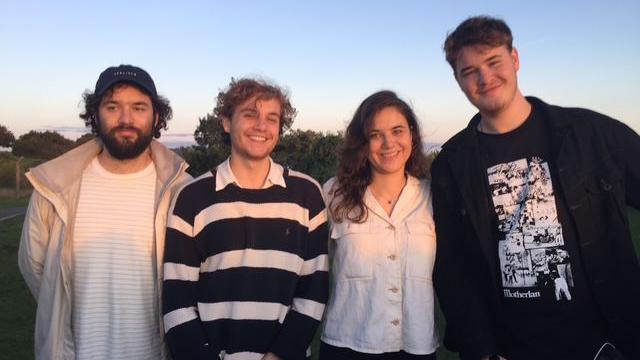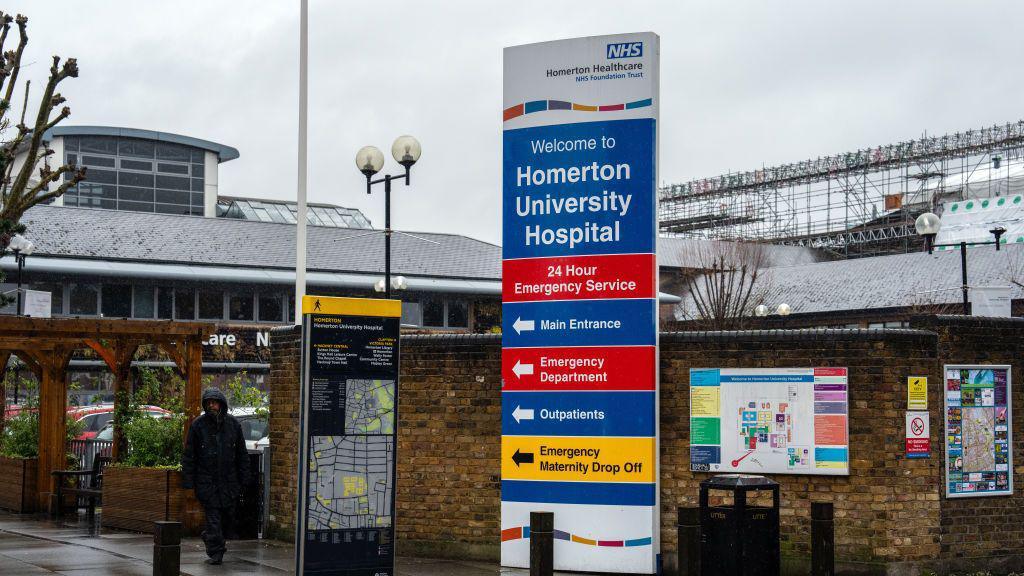Doctor asked for antibiotics eight times - inquest

William Hewes died of sepsis less than 24 hours after he arrived at hospital
- Published
A doctor whose son died of sepsis at the hospital she worked in asked for antibiotics eight times before they were given to him, an inquest has heard.
William Hewes, 22, died at Homerton University Hospital in east London in January 2023 within 24 hours of being admitted after his meningitis, caused by a meningococcal infection, developed into sepsis.
An inquest at Bow Coroner's Court into his death has already heard that medical staff failed to give him antibiotics within an hour of his arrival, as per national guidelines.
In a statement read out to court, Dr Deborah Burns, said: "I believe [antibiotics] were only given when they were because I was there."
She added: "I raised concern about the lack of antibiotics eight times before they were administered."
She also expressed her belief that her son was "left unmonitored and untreated in resus for far too long" and that his care "was no better on the ICU until it was too late".
Mr Hewes arrived at hospital at 00:06 GMT and was admitted to the hospital's resuscitation area but only received antibiotics at about 01:25 – over an hour after he arrived.
'Becoming desperate'
At first, Mr Hewes was given only one canula in his left arm which could only give him one medication at a time, the court heard.
He was given anti-sickness medication, painkillers and fluid before he was given antibiotics.
Dr Burns wrote that by 01:15 she had "become desperate" and "tried to squeeze some of the paracetamol through in order to free up the canula".
She said she was not told when antibiotics were finally administered.
The court earlier heard that the delay in giving Mr Hewes antibiotics was due to communication errors.
Dr Rebecca McMillan, who was the emergency medicine registrar that night, said she went to see Mr Hewes when he arrived in resuscitation unit and told two nurses, Matthew Potts and Marianela Balatico, that he needed antibiotics.
"Ultimately I don't know that I was clear who I was directing my instruction to," she said.
'Antibiotics slipped my mind'
Coroner Mary Hassell relayed some of Ms Balatico's previous evidence to the court, in which she said she had focused on relieving Mr Hewes's symptoms rather than chasing the doctors and that "the antibiotics slipped my mind".
The court was told Dr Burns recorded in her statement that she flagged her son had not been given antibiotics to multiple medical staff numerous times.
Dr Luke Lake, the medical registrar on call that evening, said Dr Burns may have asked him about the medicine after he had already queried it with other medical staff.
Dr McMillan said she did not recall Dr Burns raising the alarm about the antibiotics.
In her statement to the court, Dr Burns added: "The grief will never go away.
"It is impossible to describe adequately... the feelings of betrayal that I feel about William's death and the aftermath."

William, right, was the youngest of his siblings, Theo, Edward and Emily
Dr Petr Dlouhy, the intensive care unit (ICU) consultant on call that night, told the inquest that Mr Hewes should have been transferred to intensive care earlier, as he was going into multiple organ failure.
In a statement read out by the coroner, the ICU registrar, Dr Mathuratha Sivasubramaniam, said that when she initially reviewed Mr Hewes' condition around 01:09, it was "not necessary" to admit him to intensive care as he was responding to treatment and his early warning signs were improving.
She wrote that it was a joint decision between her, Dr Lake and Dr McMillan to continue to give the patient fluids and medication in resus.
Dr Luke Lake said he made numerous calls to the ICU registrar asking for William to be transferred to intensive care at around 01:50 and 02:00.
The senior charge nurse, Mr Luke Brown, also had to make a call to intensive care as Dr McMillan felt her call at 02:30 was not treated with enough urgency and the ICU registrar had not returned to see Mr Hewes.

William Hewes died at Homerton University Hospital in January 2023
At this point, Dr McMillan told the court Mr Hewes had become dependent on oxygen support, his vision was "deteriorating" and his urine output was so low she thought his kidneys were "failing".
"It was clear she was coming back," she testified. "But I was left with the impression that she wasn't behaving with the same urgency [as me].
"I was concerned about the timeliness."
Dr Dlouhy said that shortly after 03:00 he was called by Dr Sivasubramaniam to ask about admitting Mr Hewes to intensive care.
"She should [have] called me earlier," he said.
He said if he had known that Mr Hewes "looked very unwell", had an impaired kidney and already had two organ failures, he would have "obviously" admitted him earlier than 03:00.
However, he stressed that the only additions to the care the patient would have received in intensive care compared to resus would have been to monitor his blood pressure continuously, monitor his fluid intake more closely and possibly filter his blood earlier.
Asked by the coroner if this could have saved Mr Hewes' life, he said: "I really don't know."
The inquest continues.
Additional reporting by PA Media.
Listen to the best of BBC Radio London on Sounds and follow BBC London on Facebook, external, X, external and Instagram, external. Send your story ideas to hello.bbclondon@bbc.co.uk, external
- Published13 February
